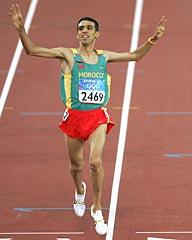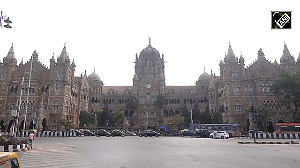Hicham El Guerrouj completed a historic Olympic 1,500-5,000 metres double on Saturday after a battle royal with Kenenisa Bekele.
The Moroccan emulated the achievement of Finn Paavo Nurmi in 1924 as he cruised to victory in the 5,000 in one of the most mouth-watering head-to-heads of the Athens Games.
 He timed 13 minutes 14.39 seconds. Silver went to Ethiopia's Bekele, a metre back, with 19-year-old world champion Eliud Kipchoge of Kenya taking bronze.
He timed 13 minutes 14.39 seconds. Silver went to Ethiopia's Bekele, a metre back, with 19-year-old world champion Eliud Kipchoge of Kenya taking bronze.
Bekele, just turned 22, had been hoping to complete an historic double of his own. He won the 10,000 in Athens and was aiming to become the first man since compatriot Miruts Yifter in 1980 to win the long-distance double.
El Guerrouj, however, played the perfect waiting game under the Olympic stadium floodlights, allowing the Ethiopians and Kenyans to dictate the early pace as the race surged and slowed.
With 800 to go the big three were at the front of an eight-man group.
By the bell, six were left in contention as Kipchoge pushed off the front. Bekele burst past with 200 to go, Kipchoge flailing desperately on his inside and Guerrouj smoothly making ground on the outside.
The Moroccan went clear in the final 30 metres and even had the luxury of easing up before raising two fingers, one for each of his Athens triumphs, as he crossed.
The race was a re-run of the world championships 5,000 last year when Bekele and El Guerrouj had approached the starting line having both won their earlier events.
Then, however, Kipchoge stole the gold to upstage them both.
For most, Bekele, a man of huge ambition and pride and already being touted as one of the greatest of all time, had started as favourite at the Olympic stadium on Saturday.
His achievements over the past 12 months include a 10,000 world title, world records at both 5,000 and 10,000, a third successive double at the cross-country world championships and the Olympic 10,000 title.
The quietly spoken El Guerrouj, meanwhile, after missing out on gold in 1996 and 2000, had fulfilled his dream by winning the 1,500.
Few thought he would have the drive to lift himself again.









 © 2025
© 2025